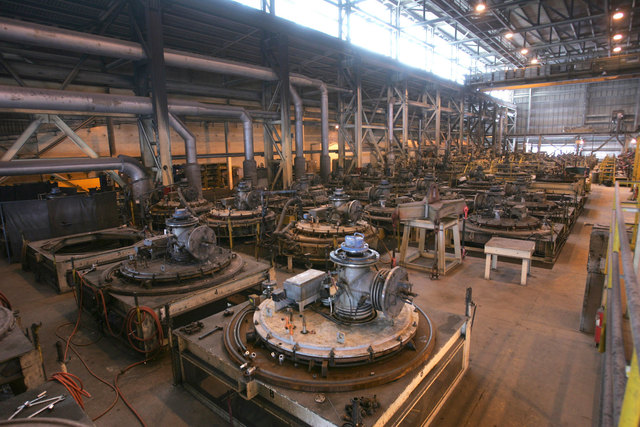Henderson company to pay record fine for dumping cancer-causing chemicals
One of the world’s largest titanium manufacturers has agreed to pay a record $13.8 million penalty for producing and dumping banned cancer-causing chemicals at its Henderson factory.
Under a settlement with federal regulators announced Wednesday, Titanium Metals Corporation, or TIMET, also agreed to perform an extensive investigation and cleanup of potential contamination from the unauthorized manufacture and disposal of PCBs at its 108-acre site on Lake Mead Parkway east of U.S. Highway 95.
According to the Department of Justice and the U.S. Environmental Protection Agency, TIMET’s penalty is the largest ever imposed for violations of the Toxic Substances Control Act at a single facility.
The corporation will pay another $250,000 for violations related to illegal disposal of hazardous waste water.
The contamination was first discovered almost a decade ago and is already being cleaned up around the 64-year-old industrial operation, just north of a Target shopping center and down the street from a hospital.
“It’s been controlled. It’s not a risk to the people or the environment” surrounding the site, said JoAnn Kittrell, spokeswoman for the Nevada Division of Environmental Protection, which has been monitoring the cleanup since 2007.
PCBs were used extensively in hundreds of industrial and commercial applications for 50 years until their manufacture was banned in 1979 amid health concerns.
The man-made organic chemicals are known to cause cancer and a range of other health problems. They do not break down naturally, so they linger in the environment for a long time.
The settlement comes on the heels of a far larger cleanup agreement announced early last month for the same swath of industrial land, which helped give Henderson its start during World War II.
Under that deal, owners of the old Kerr-McGee chemical plant, next to TIMET’s facility, agreed to pay the federal government $1.1 billion to continue cleaning up the nation’s largest plume of perchlorate, a rocket fuel ingredient that can interfere with thyroid function in humans.
The plume, unrelated to TIMET’s operation, has found its way into Lake Mead, a main water source for the Las Vegas Valley and much of the Southwest.
The EPA has yet to set a safe drinking water standard for perchlorate, but a cleanup effort underway since 1997 has significantly reduced it to nearly undetectable levels in the lake.
TIMET’s violations stem from EPA inspections in 2005, 2006 and 2008 that showed the company had been illegally producing PCBs as a byproduct of its titanium manufacturing process and disposing of the banned chemical in a solid-waste landfill and a trench at the plant.
The company was also accused of illegally dumping acidic, corrosive water into an unapproved waste pond at the facility.
Officials at TIMET and its parent company, Precision Castparts Corporation, could not be reached for comment Wednesday.
An automated phone message at the titanium plant in Henderson still refers media to the Dallas-based company that sold TIMET several years ago.
TIMET has been working with the EPA since 2007 to bring its Henderson operation into compliance.
According to environmental regulators, the company has already spent about $6 million on investigation, site cleanup and compliance measures.
That work includes extensive sampling; draining and relining a waste pond; removing PCB waste from its solid-waste landfill; and decontaminating processing equipment.
TIMET estimates it will spend at least $1 million to complete the additional work required by the settlement under supervision of the EPA and the state Division of Environmental Protection.
EPA officials expect the settlement to result in the removal of about 84,000 pounds of PCB-contaminated waste from the environment and prevent the improper disposal of 56 million pounds of hazardous waste each year.
TIMET, headquartered near Philadelphia, produces titanium jet engine parts.
According to the EPA, the company has supplied nearly one-fifth of the world’s titanium demand since 1950.
Both TIMET and the old Kerr-McGee plant site are part of the BMI complex, a roughly 5,000-acre tract set aside by the federal government in 1941 for production of magnesium to support the war effort.
Later, portions of the giant magnesium plant and adjacent land were leased out for the production of various chemicals and products containing chemicals.
For years, industrial waste from those operations was regularly disposed of in unlined evaporation ponds or dumped onto the ground or into ditches that ran off the site, practices common and legal at the time.
A lot has been done in recent years to reverse some of the damage, but a lot more work lies ahead, Kittrell said.
“The legacy issues at that site — they keep NDEP busy, that’s for sure.”
Contact Henry Brean at hbrean@reviewjournal.com or 702-383-0350. Find him on Twitter: @RefriedBrean.

















